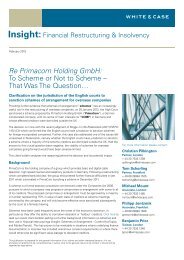Mexican Legal Framework of Business Insolvency - White & Case
Mexican Legal Framework of Business Insolvency - White & Case
Mexican Legal Framework of Business Insolvency - White & Case
Create successful ePaper yourself
Turn your PDF publications into a flip-book with our unique Google optimized e-Paper software.
taking any action to improve the relative position <strong>of</strong> a creditor to the detriment <strong>of</strong> other<br />
participating creditors. They also include similar undertakings from the debtor and other<br />
terms such as a sharing <strong>of</strong> information and lock-up covenants.<br />
The validity and enforceability <strong>of</strong> undertakings by creditors refraining from exercising<br />
procedural rights is questionable [CPM 1, 8, 17; CCF 6], and specific performance may be<br />
unavailable [CFPC 421, 423].<br />
The exchange <strong>of</strong> information raises another legal issue: Mexico does not have a rule<br />
preventing shared information from being used as evidence in a court <strong>of</strong> law, and<br />
confidentiality agreements may not be strong enough to prevent disclosure <strong>of</strong> such shared<br />
information as evidence in a judicial process [CFPC 79].<br />
3. Interim Financing<br />
The case where the debtor requires New Money to continue operating during the standstill<br />
period raises the question <strong>of</strong> how the New Money provider will be recognized in priority over<br />
preexisting creditors. INSOL (2000) takes a very clear position on the issue:<br />
10<br />
Where a debtor requires New Money funding, relevant creditors will be concerned that<br />
such New Money will, so far as practicable, be given priority <strong>of</strong> repayment compared<br />
with other debts in the event <strong>of</strong> the failure and insolvency <strong>of</strong> the debtor.<br />
The simplest method <strong>of</strong> ensuring the priority <strong>of</strong> repayment for New Money is usually by the<br />
obtaining <strong>of</strong> security for its repayment over assets <strong>of</strong> the requisite value. In some cases,<br />
however, negative pledges in favor <strong>of</strong> third parties or other legal complications will either<br />
prevent the granting <strong>of</strong> security for New Money or render the benefit which will result from<br />
such security uncertain. While there are various techniques for ameliorating such problems<br />
(e.g., asset purchase arrangements, placing assets into newly formed and “ring-fenced”<br />
borrowing entities and sale and leaseback arrangements) in some cases relevant creditors will<br />
have no option but to fall back on loss-sharing arrangements between themselves designed<br />
to ensure that the New Money will be accorded priority <strong>of</strong> repayment status (e.g., by agreeing<br />
to “pool” recoveries from any insolvency <strong>of</strong> the debtor and to apply them in repayment <strong>of</strong><br />
the New Money first or, in certain jurisdictions, by the use <strong>of</strong> subordination agreements).
















